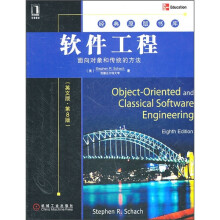软件工程:面向对象和传统的方法(英文版·第8版)
作者:(美)沙赫 著
出版:机械工业出版社 2011.6
页数:667
定价:79.00 元
ISBN-13:9787111341963
ISBN-10:7111341961
去豆瓣看看 preface iv
chapter 1 the scope of software engineering
learning objectives
1.1 historical aspects
1.2 economic aspects
1.3 maintenance aspects
1.3.1 classical and modern views of maintenance
1.3.2 the importance of postdelivery maintenance
1.4 requirements, analysis, and design aspects
1.5 team development aspects
1.6 why there is no planning phase
1.7 why there is no testing phase
1.8 why there is no documentation phase
1.9 the object-oriented paradigm
1.10 the object-oriented paradigm in perspective
1.11 terminology
1.12 ethical issues
chapter review
for further reading
key terms
problems
references
part a software engineering concepts
chapter 2 software life-cycle models
learning objectives
2.1 software development in theory
2.2 winburg mini case study
2.3 lessons of the winburg mini case study
2.4 teal tractors mini case study
2.5 iteration and incrementation
2.6 winburg mini case study revisited
2.7 risks and other aspects of iteration and incrementation
2.8 managing iteration and incrementation
2.9 other life-cycle models
2.9.1 code-and-fix life-cycle model
2.9.2 waterfall life-cycle model
2.9.3 rapid-prototyping life-cycle model
2.9.4 open-source life-cycle model
2.9.5 agile processes
2.9.6 synchronize-and-stabilize life-cycle model
2.9.7 spiral life-cycle model
2.10 comparison of life-cycle models
chapter review
for further reading
key terms
problems
references
chapter 3 the software process
chapter 4 teams
chapter 5 the tools of the trade
chapter 6 testing
chapter 7 from modules to objects
chapter 8 reusability and portability
chapter 9 planning and estimating
chapter 10 key material from part a
chapter 11 requirements
chapter 12 classical analysis
chapter 13 object-oriented analysis
chapter 14 design
chapter 15 implementation
chapter 16 postdelivery maintenance
chapter 17 more on uml
chapter 18 emerging technologies
bibliography
appendix
author index
subject index
Stephen R.Schach,1972年获魏兹曼科学院物理学理科硕士学位,1973年获开普敦大学应用数学博士学位,目前是美国范德比尔特大学计算机科学和计算机工程名誉教授。他的研究兴趣主要集中在软件工程领域,特别是对软件维护与开源软件的实验分析有深入研究。他著有多部软件工程、面向对象系统分析与设计方面的教材。
《软件工程:面向对象和传统的方法(英文版·第8版)》对软件工程的基础知识(包括面向对象和传统方法)进行了严谨和全面的介绍,是软件工程领域的经典著作。
《软件工程:面向对象和传统的方法(英文版·第8版)》共分两大部分:第一部分介绍基本的软件工程理论;第二部分讲述更实用的软件生命周期。作者采用这种独特的、极具可读性的组织方式,帮助学生和广大读者理解软件工程中的一些复杂概念。
最新版第8版对《软件工程:面向对象和传统的方法(英文版·第8版)》进了整体更新,新增两章内容,分别概括介绍软件工程的关键知识点和近年涌现的新技术。
比价列表







 缺书网
缺书网 扫码进群
扫码进群